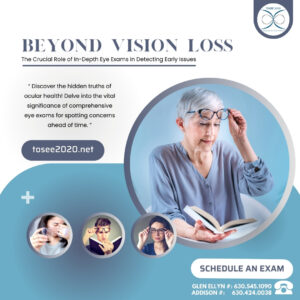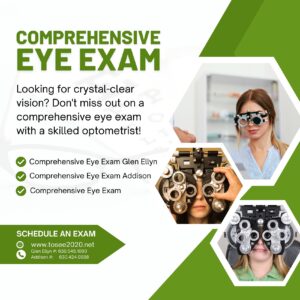Preserving Your Vision: The Vital Role of Eye Exams in Detecting and Preventing Serious Health Concerns.
Our eyes are often regarded as windows to the soul but offer a unique glimpse into our overall health. Beyond their role in providing vision, our eyes can be early indicators of various underlying health conditions. Regular eye exams play a critical role in maintaining good vision and detecting and preventing serious health issues before they escalate. This article will delve into the fascinating world of eye exams, exploring how they go beyond eyesight correction and serve as a frontline defence against various medical concerns.
The Link Between Eyes And Overall Health:

The intricate connection between our eyes and overall health is a testament to the complexity of our bodies. Many systemic health conditions can manifest with ocular symptoms. Diabetes, for instance, can lead to diabetic retinopathy, a condition that damages the blood vessels in the retina. High blood pressure might cause hypertensive retinopathy, characterized by changes in the retina’s blood vessels. These ocular manifestations affect vision and act as red flags for underlying health conditions.
The Hidden Clues In The Eyes:
When we think of eye exams, we often associate them with checking for vision impairments like nearsightedness or astigmatism. While addressing refractive errors is essential, comprehensive eye exams encompass a broader scope. Ophthalmologists and optometrists are trained to look beyond visual acuity, meticulously examining the various structures of the eye.
The Comprehensive Eye Exam: More Than Meets The Eye:
A comprehensive eye exam extends well beyond evaluating visual acuity. It involves a series of tests and evaluations that can provide valuable insights into your health. Here’s what a thorough eye exam typically entails:
- Visual Acuity Test:
- This standard eye chart test measures how well you can see at various distances. While its primary purpose is to determine the need for corrective lenses, it can also indicate other vision-related issues.
- Pupil Dilation:
- The eye doctor may use eye drops to dilate your pupils, allowing them to examine the back of your eye, including the retina and optic nerve. This can reveal signs of diabetes, hypertension, and even some forms of cancer.
- Tonometry:
- This test measures the pressure within your eye, helping to diagnose conditions like glaucoma. However, elevated eye pressure can also indicate underlying health concerns.
- Slit Lamp Exam:
- This high-powered microscope allows the eye doctor to examine the structures at the front of the eye in detail. It can uncover conditions like cataracts and corneal issues but also reveal signs of autoimmune diseases and certain infections.
- Visual Field Test:
- By assessing your peripheral vision, this test aids in diagnosing conditions such as glaucoma and neurological disorders.
- Retinal Imaging:
- Advanced technology allows for detailed imaging of the retina. Changes in the blood vessels or abnormalities can indicate various health issues, from cardiovascular disease to multiple sclerosis.

Detecting Health Issues Through Eye Exams:
- Diabetes:
- Diabetes can lead to diabetic retinopathy, which causes damage to the blood vessels in the retina. Regular eye exams can detect early signs of this condition, enabling timely intervention to prevent vision loss.
- Hypertension:
- Changes in blood vessels in the retina can signal hypertensive retinopathy, offering a glimpse into high blood pressure’s impact on the cardiovascular system.
- Cardiovascular Disease:
- Cholesterol buildup in the blood vessels can be seen as yellowish deposits in the eye’s blood vessels, indicating potential cardiovascular risks.
- Autoimmune Disorders:
- Inflammation in the eye can point to autoimmune diseases like lupus and rheumatoid arthritis.
- Thyroid Issues:
- Bulging eyes or changes in eye appearance might indicate thyroid disorders like Graves’ disease.
- Cancer:
- Some forms of cancer, such as melanoma, can present as unusual growths or changes in the pigmented cells of the eye.
Prevention Through Early Detection:
The adage “prevention is better than cure” holds regarding eye health and overall well-being. Early detection of health issues through eye exams empowers individuals to take proactive measures. For instance, managing diabetes effectively can prevent or slow diabetic retinopathy’s progression. Timely intervention for hypertension can mitigate the risk of cardiovascular complications. By identifying signs of systemic diseases in their early stages, eye exams enable individuals to make lifestyle changes, seek appropriate medical treatment, and prevent more severe health issues from developing.
Conclusion:
While the primary purpose of eye exams is to assess and correct vision problems, their potential extends far beyond eyesight. Our eyes offer vital clues about our overall health, serving as silent messengers that warn us of underlying medical conditions. Regular, comprehensive eye exams are essential for maintaining clear vision and safeguarding our well-being. By prioritizing eye health, individuals can embrace a holistic approach to health care, using their eyes as a powerful tool for early detection and prevention. Remember, when it comes to your eyes, every exam is a step toward comprehensive well-being.
Visit Tosee2020 to get best eye exam services in town.

